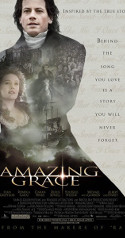
Directed by
Michael Apted
118 minutes
Rated PG
Reviewed by
Sharon Hurst


Amazing Grace
Synopsis: Britain in the late 1700s operated a mighty empire which included a lucrative trade in rum and sugar underpinned by the use of slave labour brought from West Africa. Born into wealth, William Wilberforce (Ioan Griffud) was elected to Parliament in his early twenties. Having a strong Christian conscience he felt himself torn between a life of religious abnegation and a career in which he used his principles and his power to effect massive social change, namely the abolition of the reprehensible and horrific slave trade.
Amazing Grace not only informed me but held me spellbound, moved me deeply and even inspired me.
William Wilberforce's character is demonstrated in the opening scene. With his coach bogged on a muddy road and the horse collapsed, a driver is mercilessly whipping the poor beast. Wilberforce alights from his passing carriage to admonish the driver and we immediately know he is a man who will stand up for his principles. We have met our main character at a time when his health has declined and he is recuperating with friends in the country. Through these friends he meets Barbara Spooner (Romola Garai) to whom he relates the story of his many years fighting in Parliament for abolition and via this filmic device we are taken back to follow his earlier career.
The depictions of the brawling in the House of Commons are a sorry reflection on politicians behaving badly both then and now. Parliament is debating the rationale of Britain's involvement in the War of Independence in America, when WW is asked to define the difference between appeasement and surrender. He stands tall and claims it to be "a matter of time and the loss of 10,000 more young lives". Familiar? Many of the other politicians are played by top British actors, notable Toby Jones as the pro-slavery Duke of Clarence, Michael Gambon as Lord Fox, Ciaran Hinds as Lord Tarleton, and talented newcomer, Benedict Cumberbatch, as William Pitt, the youngest-ever British Prime Minister, aged 24 and a friend of WW. The various machinations and factional fighting among these men is intriguing, but even more resonant for today's world is the situation of politicians knowing what is right and wrong, but refusing to legislate for fear of damaging the economy and putting the noses of wealthy lobby groups out of joint.
A vital character, giving the film its title, is John Newton, played by the marvellous Albert Finney. Newton had been a slave ship's captain, but after a mid-life epiphany devoted his life to the church as penitence, writing many beautiful hymns, one of them being Amazing Grace. Also significant is Thomas Clarkson played by Rufus Sewell. Clarkson was a founding member of the Abolitionist movement and travelled the world amassing evidence of the horrors of the slave trade. With him is Ouladah Equiano (a commendable performance by esteemed Senegalese singer Youssou N'Dour), a slave who eventually bought his freedom and wrote an autobiography which became a valuable tool in the anti-slavery movement. Lastly the spirited and beautiful Barbara is finely portrayed by Garai as a woman vital to keeping WW on the trail of his dreams.
With director Apted at the helm, Amazing Grace steers an unusual course in that it shows only moments of actual slavery (as experienced by Wilberforce in his nightmares). Instead it draws a trenchant power from verbal descriptions of the heinous practice and what our minds can imagine is all the more ghastly.
Griffud brings to his character an energy and compassion that elicits total admiration. Because the film's fluid time structure goes from past to present and also alternates between politics and the very personal, it never loses our interest. It also spans a couple of decades, and seldom have I seen such a fine job of aging all the cast members. Apted's judicious direction, a marvellous ensemble cast, stunning period detail and evocative cinematography combine to create a film that will uplift.
Want something different?





